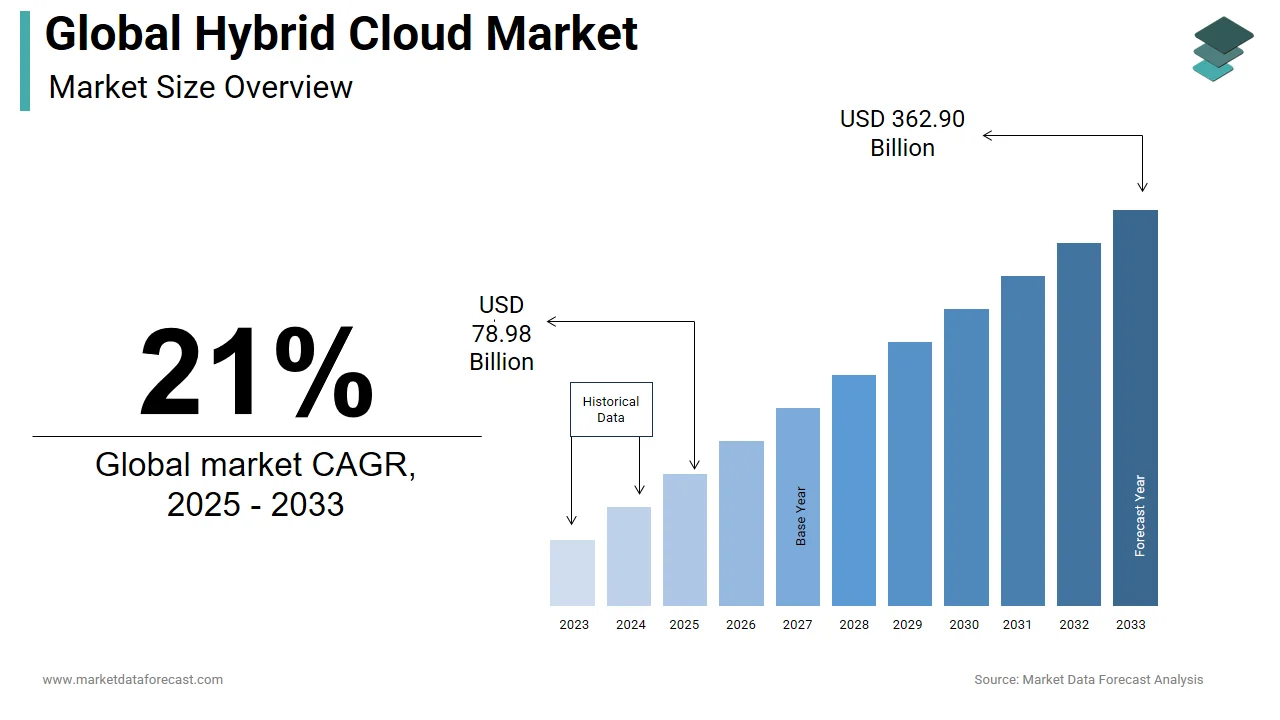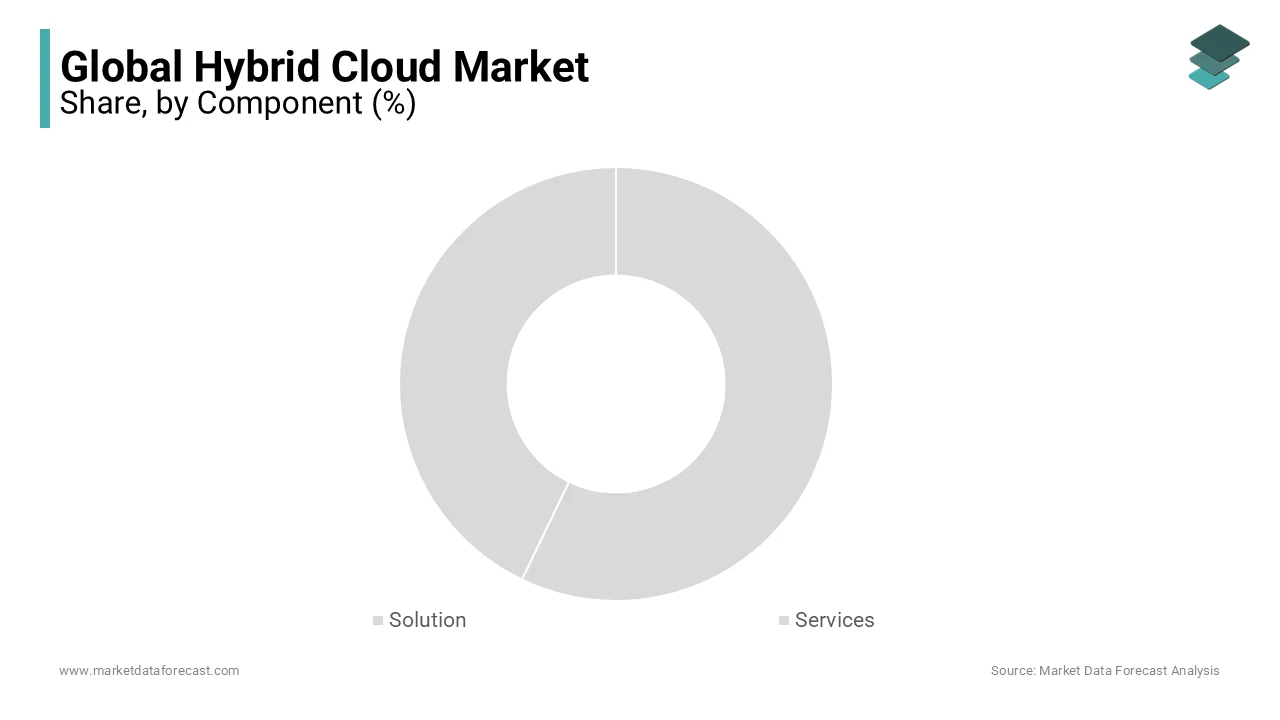Global Hybrid Cloud Market Size, Share, Trends, Growth Forecast Report – Segmented By Component (Solution and Services), Service Type (Disaster Recovery, Hybrid Hosting, Cloud Management, and Orchestration), Service Model (Infrastructure, Platform, and Software), Organization Size (Large, Medium, and Small-scale enterprises), Vertical (Banking, Telecommunications, Healthcare, and Media Management), & Region - Industry Forecast From 2024 to 2032
Global Hybrid Cloud Market Size (2024 to 2032)
The global hybrid cloud market size was valued at USD 53.94 billion in 2023 and is expected to grow from USD 65.27 billion in 2024 to USD 299.91 billion by 2032, at a CAGR of 21.0% during the forecast period. North America has dominated the global market in terms of market share and revenue.

MARKET DRIVERS
Key growth drivers in the hybrid cloud market include the focus on agile and scalable IT processes, the many benefits of the hybrid cloud, and increasing volumes of business data. The emergence of hybrid IT services, coupled with increased emphasis on analytics, is expected to open new growth opportunities for this market in the foreseeable future.
MARKET RESTRAINTS
Concerns related to the integration and operational aspects of the hybrid cloud, a lack of technical expertise, and security issues remain the main challenges affecting market growth globally.
REPORT COVERAGE
|
REPORT METRIC |
DETAILS |
|
Market Size Available |
2023 to 2032 |
|
Base Year |
2023 |
|
Forecast Period |
2024 to 2032 |
|
CAGR |
21% |
|
Segments Covered |
By Component, Service Type, Service Mode, Organization Type, Vertical, and Region. |
|
Various Analyses Covered |
Global, Regional & Country Level Analysis, Segment-Level Analysis, DROC, PESTLE Analysis, Porter’s Five Forces Analysis, Competitive Landscape, Analyst Overview on Investment Opportunities |
|
Regions Covered |
North America, Europe, APAC, Latin America, Middle East & Africa |
|
Market Leaders Profiled |
IBM (US), Microsoft (US), Cisco Systems (US), AWS (US), Oracle (US), Google (US), VMware (US), Alibaba (China), Equinix (US), Rackspace (US), NetApp (US), Atos (US), Fujitsu (Japan), CenturyLink (Louisiana), HPE (US), DXC (US), RightScale (US), Micro Focus (US), NTT Communications (Japan), Dell EMC (US), Citrix (US), Pure Storage (US), Unitas Global (US), and Quest Software (US) and Others. |
SEGMENTAL ANALYSIS

KEY PLAYERS IN THE GLOBAL HYBRID CLOUD MARKET
- IBM (US)
- Microsoft (US)
- Cisco Systems (US)
- AWS (US)
- Oracle (US)
- Google (US)
- VMware (US)
- Alibaba (China)
- Equinix (US)
- Rackspace (US)
- NetApp (US)
- Atos (US)
- Fujitsu (Japan)
- CenturyLink (Louisiana)
- HPE (US)
- DXC (US)
- RightScale (US)
- Micro Focus (US)
- NTT Communications (Japan)
- Dell EMC (US)
- Citrix (US)
- Pure Storage (US)
- Unitas Global (US)
- Quest Software (US)
RECENT DEVELOPMENTS GLOBAL HYBRID CLOUD MARKET
The hybrid cloud is becoming a leading cloud solution because it offers a variety of benefits, such as cost, efficiency, agility, mobility, and elasticity. While the North American region is the largest market for hybrid cloud, it is the Asia Pacific which is growing at a faster pace.
-
In June 2018, Microsoft acquired GitHub, a leading provider of software development platforms. This Acquisition would enable developers to gain more at every stage of the development lifecycle, accelerate business use of GitHub, and bring Microsoft's development tools and services to new audiences.
-
In May 2017, IBM managed to acquire the cloud and managed to host the business services of Verizon. It is said that this acquisition would augment IBM's cloud business services. Microsoft has finally, after more than two years of commercialization, launched Azure Stack, a private cloud IaaS platform designed to mirror the Azure public cloud. With this move, the very first deployments of Azure Stack are already put on the market. Meanwhile, Amazon Web Services has partnered with Silicon Valley's virtualization giant to deliver a VMware hybrid cloud offering on AWS. Google Cloud Platform is in partnership with VMware and Nutanix for the same reason.
-
In November 2016, AWS launched two new hybrid services, namely AWS Greengrass and AWS Snowball Edge, to help its customers extend the AWS Cloud to their connected devices.
DETAILED SEGMENTATION OF THE GLOBAL HYBRID CLOUD MARKET INCLUDED IN THIS REPORT
This research report on the global hybrid cloud market has been segmented and sub-segmented based on the component, service type, service model, organisation type, vertical, and region.
By Component
- Solution
- Services
By Service Type
- Disaster recovery
- Hybrid hosting
- Cloud management & orchestration
By Service Model
- Infrastructure
- Platform
- Software
By Organisation Type
- Large
- Medium
- Small-scale
By Vertical
- Banking
- Telecommunications
- Healthcare
- Media management, etc.
By Region
- North America
- Europe
- Asia Pacific
- Latin America
- Middle East & Africa
Frequently Asked Questions
What is driving the growth of the hybrid cloud market globally?
The growth of the hybrid cloud market is primarily driven by the increasing adoption of digital transformation initiatives across various industries, the need for scalable and flexible IT infrastructure, and the demand for seamless integration of on-premises and cloud environments.
What are the key challenges hindering hybrid cloud adoption on a global scale?
Challenges such as data security concerns, interoperability issues between on-premises and cloud environments, and the complexity of managing hybrid infrastructures remain significant barriers to adoption. Addressing these challenges requires comprehensive security measures, robust integration solutions, and streamlined management tools.
How do hybrid cloud solutions facilitate seamless integration with existing IT infrastructure and legacy systems?
Hybrid cloud solutions offer robust integration capabilities through APIs, middleware, and hybrid cloud management platforms, enabling seamless connectivity between on-premises infrastructure, legacy systems, and cloud environments. This integration simplifies the migration process and ensures interoperability across hybrid deployments.
What trends are shaping the future of the hybrid cloud market on a global scale?
Emerging trends such as multicloud adoption, edge computing integration, AI-driven automation, containerization, and serverless computing are reshaping the hybrid cloud landscape. These trends reflect the evolving needs of businesses for greater agility, scalability, and innovation in their IT infrastructure strategies.
Related Reports
Access the study in MULTIPLE FORMATS
Purchase options starting from $ 2500
Didn’t find what you’re looking for?
TALK TO OUR ANALYST TEAM
Need something within your budget?
NO WORRIES! WE GOT YOU COVERED!
Call us on: +1 888 702 9696 (U.S Toll Free)
Write to us: [email protected]